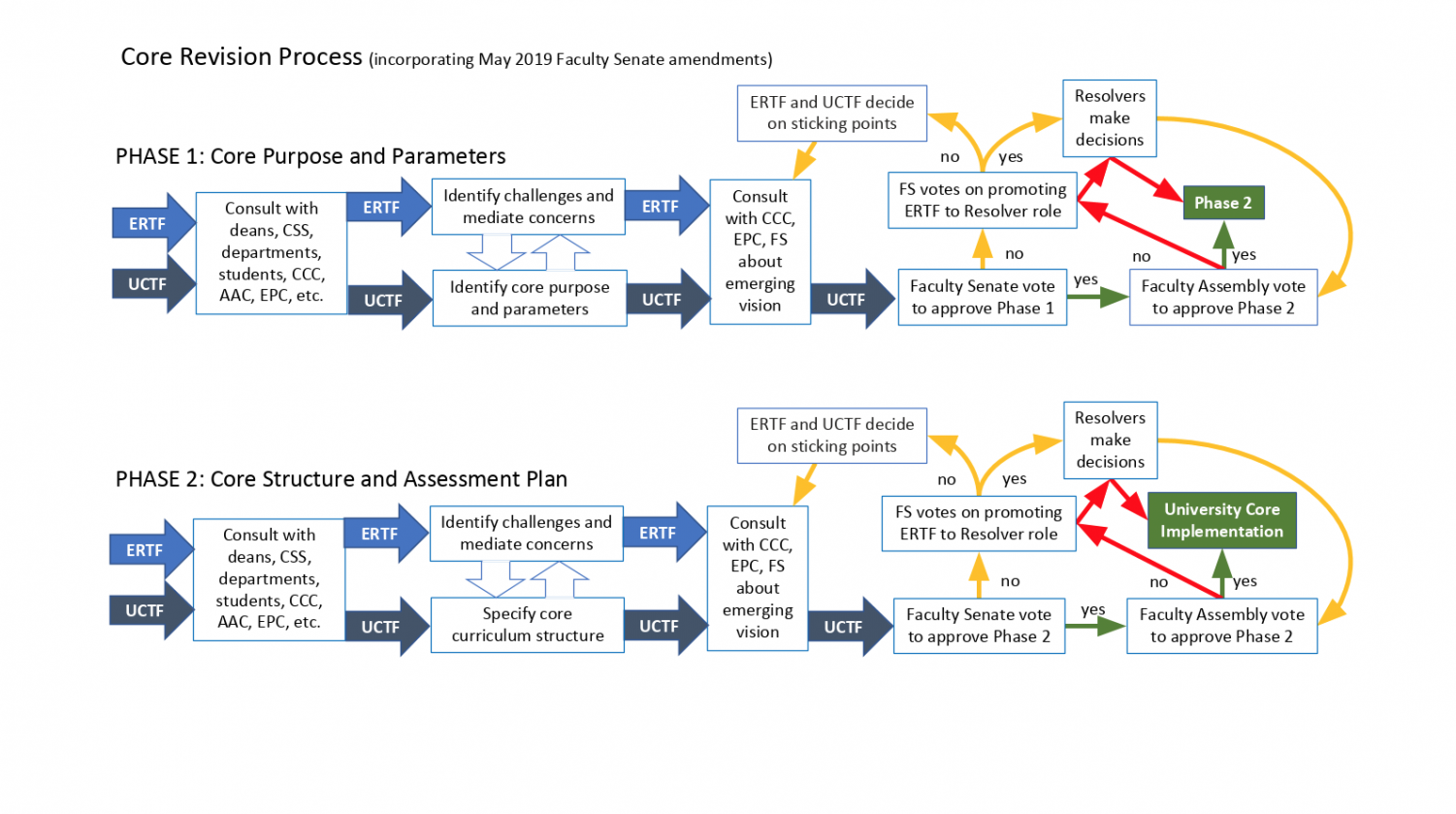New Core revision process gives faculty senate less power
In order to create a university-wide common core, faculty senate has agreed to limit its power in determining the new curriculum.
The current core curriculum was approved in 2000 and has run up against problems in recent years from faculty and administration for its complexity and scale. Comments from the Education Policy Committee presented by Provost Cheryl Brandsen at faculty senate in May 2019 noted the logistical problems in assessing whether the current core is achieving its stated goals. “There’s broad agreement that the existing core is not coherent or appealing. It’s largely a scattering of courses that students many times see as something to get through, finish, get out of the way,” said Joel Westra, a political science professor and a member of the University Core Task Force. A major motion by faculty assembly to implement a new core curriculum failed in 2016, prompting a new approach.
The new core approval process involves two committees working in tandem. The first committee, the University Core Task Force, is made up of two professors from the three academic departments (social sciences and contextual disciplines; arts, languages, and education; hard sciences) voted on by their respective departments, two professors from the professional programs voted on by their respective departments, and a student selected by student senate. The second committee, Envisioner/Resolver Task Force, is structured nearly the same way as the UCTF, but with different faculty members and with the provost acting as the ninth member rather than the student representative.

The ERTF and UCTF are currently in the “Purpose and Parameters” phase of this process. They have been consulting with various deans, departments, and committees during late summer and fall with the plans of presenting their vision for the core at the end of October. Faculty senate can either approve or reject this vision. Should they approve the vision, it will go to a vote in faculty assembly. Should they reject the vision of purpose and parameters, then the ERTF committee, known up to this point as the “Envisioners,” will become the “Resolvers” and make changes to the core with regard to faculty senate inputs.
This updated vision (or the same vision, should the Resolvers choose) then goes to faculty assembly where they will have the ability to vote yes or no. If they vote yes, the UCTF and ERTF will move on to the “Core Structure and Assessment Plan” phase, which decides the details of a new core curriculum. If they vote no, the Resolvers then are tasked with making or not making changes with regard to faculty input. They then will move onto the second phase of constructing the new core.
As to what changes might come with the new core, Chynna Pomales Stohr, the UCTF student representative, noted that “We’re still in the early stages of revising core, and it would be too soon to say what the structure of the core will be and consist of. However, the core task force is working hard to sift through some older documents to revise what the Calvin University core means, and how it properly represents our liberal arts and university structure.”

Stohr’s role on the UCTF is to provide input from a student perspective, sharing an equal role as faculty members of the task force. “As the student representative, I get the privilege of communicating with members of the student body to see what exactly they think the purpose of the core should be, or what ideas they might have on the structure,” said Stohr. “The point of me being in the room is to provide feedback, input, and perspective that only a current student at Calvin University can do.”
The original target date for approval of the UCTF’s core parameters was Oct. 15 or 31, based on whether the decision was referred to Faculty Assembly or ERTF, respectively; the target date for a statement of purpose is mid-February. However, “Our task force [the UCTF] also has the ability to amend the timeline” said Westra, indicating that plans to do so were already in place. At the time of interview, Westra noted that the UCTF was planning to propose a timeline amendment within the week “to push those deadlines back slightly while still keeping them in the Fall semester.”









Natsun Eisen '14 • Oct 18, 2019 at 12:01 pm
During my time as a Calvin student, the best part of the common core curriculum was sometimes ending up in courses that I had no interest in, only to really enjoy myself and learning a lot. Several of the courses I took to fulfill the core curriculum requirements ended up changing my life forever. I can’t say that about any of the major courses I took, even though they were sometimes valuable learning.
The problem with trying to determine whether a specific set of core requirements meets its goals is that an undergraduate education is supposed to pay dividends as someone continues in their life after completing that portion of their education.
If you really want to determine the efficacy of requiring students to take a particular set of courses, you’d need to look at where taking those classes led them 5, 10 and 20 years down the road.